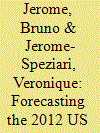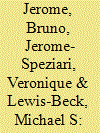|
|
|
Sort Order |
|
|
|
Items / Page
|
|
|
|
|
|
|
| Srl | Item |
| 1 |
ID:
116465


|
|
|
|
|
| Publication |
2012.
|
| Summary/Abstract |
Since 2008, the economic fallout from the subprime mortgage crisis has led to the defeat of a number of incumbents in the world's major democracies. For instance, in the former EU-15, eight countries (including France) have ousted their incumbents in favor of new leaders. The United States is no exception, and the 2012 US presidential election will see Barack Obama running for a second term during difficult economic times. After hitting a high of 10% in October 2009, the nation's unemployment rate decreased to 8.2% in May 2012. Nonetheless, this is still 0.7 percentage point higher than what Ronald Reagan faced in 1984 or what confronted George H.W. Bush in 1992 as they ran for their second terms. Looking at measures of presidential popularity for the month of May since 1980, Barack Obama's approval rating is at 46% in the Gallup polls, which is the third-worst rating after George W. Bush (30% in 2008) and George H.W. Bush (39.4% in 1992). Given Barack Obama's approval rating and the current national unemployment level, must we conclude that Barack Obama is irremediably on the ropes against Mitt Romney in 2012?
|
|
|
|
|
|
|
|
|
|
|
|
|
|
|
|
| 2 |
ID:
126326


|
|
|
|
|
| Publication |
2013.
|
| Summary/Abstract |
Our political economy model has correctly forecasted the 1998 and 2005 elections. However, in 2002 we predicted a tight race to the benefit of the Christian Democrats(CDU)/Christian Socialists(CSU)-Free Democratic Party (FDP) opposition, so underestimating the narrow defeat of the FDP by the Green Party. In the German political system, proportional representation makes single-party domination almost impossible. On the contrary, the big parties, Social Democratic Party (SPD) or CDU/CSU, are pushed to build a majority coalition. In this competition, the FDP has been the "pivotal party" in German political life, at least until 2002. Since then, the Greens have challenged the FDP, with the Ecologists allowing the SPD to form a red-green coalition in 1998 and in 2002. Similarly, in 2005 the FDP was not associated with the grand coalition driven by Angela Merkel.
|
|
|
|
|
|
|
|
|
|
|
|
|
|
|
|
|
|
|
|
|